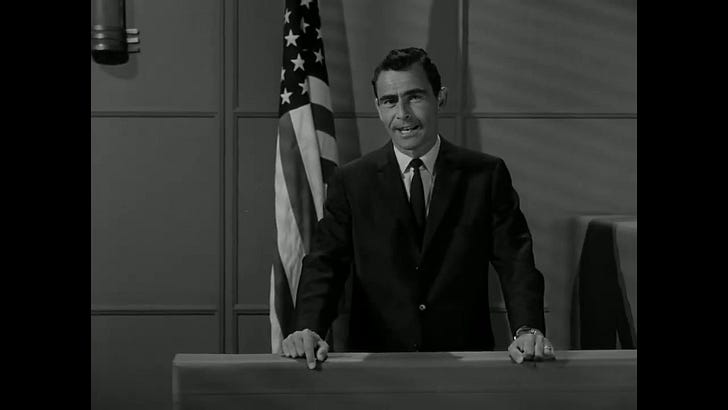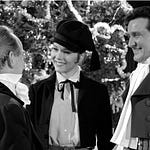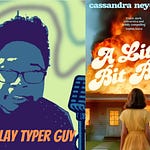Sailor St. Claire is co-artistic director of the Noveltease Theatre in Seattle. The company stages unique adaptations of classic works of theatre and literature from a sex-positive, queer, feminist, and anti-racist standpoint. The result is lively, compelling, and a lot of fun. I recently chatted with Sailor about Noveltease’s work and the current state of Seattle theatre.
Download the podcast interview above and/or watch the YouTube video below.
Transcribed excerpts from our conversation …
SER: I’m a big fan of yours and your work at the Noveltease Theatre. Can you tell folks a bit about what you do?
SAILOR ST. CLAIRE: Yeah sure, first of all thanks for saying you’re a fan. So, the Noveltease Theatre is a literary burlesque company and what we do is long form plays with burlesque. And we use burlesque much in the way you would use song or dance in a musical to drive the story forward.
So every piece of burlesque that we offer has something to do with the narrative. So we're taking a little bit of the elements of contemporary striptease and infusing that with a theatrical form that people are really familiar with. And what I love about this work is that this actually really harkens back to the way that burlesque started in the United States in the 1880s. Most people don't know that. But when the genre came to America, it was all of these all-female acting troupes that would do parodies of classical dramas or political satire. And they would not be using striptease as part of the vocabulary. You couldn't really do that then. But they would often perform in drag, which meant that they would wear clothing that was often a bit more titillating or revealing of the female form than would have been acceptable in the 1880s. So I like to think we're continuing this kind of bygone tradition in burlesque.
SER: How do you choose sort of material that you adapt and kind of what approach do you take when you’re considering something?
SAILOR: Yeah, that’s a great question. We do actually pay a lot of homage or operate in the tradition of Book-It [Repertory Theatre] because we too do direct text adaptations. We use the words on the page. I think our adaptation rules are a little bit looser than theirs are. We will do things like change pronouns or change verbs to make things fit the mouth of an actor and we edit pretty judiciously.
But to your question about how we choose what we choose, the joke we often tell at Noveltease is how do we take this classic novel and make it more gay? And that has been pretty true of a lot of the work that we’ve chosen. So we end up selecting things that are only in the public domain, first of all, and that’s because part of our mission is about interrogating and reframing, reworking and reclaiming classic texts. It’s interesting to go back and take something old and read it and reread it and read it against the grain or read it with a more contemporary lens and to think through what are the possibilities that this offers? Does this text allow for us to create a queer reading or queer understanding? Is that something that comes from the text? Or if we were to do that, is that imposing something that doesn’t work with the original intention?
For example, we did our production of Northanger Abbey in our very first year back in 2019, which we chose because most of our company members really love Jane Austen, but we wanted to pick a Jane Austen that was less understood or less well-read. And Northanger Abbey has some love triangles in it that I think are really interesting to reframe through cross-gender casting in a contemporary context. And if you read the book, you see that some of the female friendships in that novel are really rife for bringing forth in a more kind of queer-forward adaptation. So those are some of the things that we think about, but we often kind of let our company members bring stuff forth to us. Someone says, “Hey, I’m really interested in this book, and I was thinking about what does the Odyssey look like if we focus more on Penelope than Odysseus,”which was a project we did during the pandemic. We did a dance film of the Odyssey.
What does it look like to do Jekyll and Hyde as a trans narrative? That’s something that one of our company members has started to percolate on. How do we weave together a bunch of Edgar Allen Poe stories and transform that into something? So our company members are often bringing us books that they’re interested in. That’s really great to see because it used to be myself and my artistic director saying, “Well, I’m really passionate about this book, what do you all think?“ And [they’d say,] “Sure, sounds great.” So we’re starting to entertain pitches from our folks within our company, and sometimes from outside partners as well.
SER: Can you tell folks a bit about your background and how that applies to work you do?
SAILOR: So Sailor St. Claire is the Showgirl Scholar. That’s a little hashtag I started giving myself because I began my career in burlesque when I was in graduate school, studying for my PhD in English at the University of Washington, which I received in 2016. I’m a student of American literature. I did the adjunct professor thing for a while before switching entirely into the nonprofit sector where I reside now.
When I’m working on adapting a text, I’m often thinking about how it functions from a more theoretical standpoint, right? Does it work with a queer lens? What are the perspectives that we as readers bring to a particular text? And how can that continue? How can we manifest that as we bring it forth to the stage? I think that’s a really lovely and interesting thing about the work of adaptation in particular, because you’re always bringing, you always have the opportunity to look at the text from different angles and different lenses. I love seeing adapted work that draws from the language on the page in ways that open up those worlds and allow you to frame things differently to give different voices to the text.
To Book-It’s credit, I think they always did a really remarkable job in creating great ensembles of characters who could speak these other aspects of the text aloud, which I always thought was really interesting. I think we too also get the ability to play with who says what … does it mean if you give a line that very famously belongs to one character to another? How can you transform the text in that way?
Covid’s impact on theatre
SAILOR: We were gearing up to do Sherlock Holmes and we all went to rehearsal on a Wednesday, March 11th. We got into the rehearsal room and that was the day that Governor [Jay] Inslee shut down all public assembly. And we said, “OK, well, this is terrible. This sucks.”
We’re two weeks away from opening. We posted a postponement notice. Hopefully we thought, yeah, April, that’ll work. And then we posted another postponement notice. Yeah, July, that’ll work. That’ll be great. Then by July, we realized the uncertainty in which we were living and we postponed that show indefinitely. We did get to do actually mount that in 2022, but yeah those two years were weird.
Noveltease did the initial online pivot and we read stories online … then we did a web series for a little while where we were showcasing individual acts in conversation, more like an Inside The Actors Studio kind of thing where we would have people pair an act with a piece of literature and then talk about that, package that as a web series. We made a dance film that was really hard, never going to make a movie ever again. That’s why we do stage stuff, because movies are hard.
Eventually, at the end of 2021, we were able to start getting back into doing some live performance stuff, but I think it was just really challenging. It was really personally challenging for me mentally, as I’m sure it was for many people, to not have the creative outlet that I rely upon, which needs a live audience. I was also still teaching at the time and really put into perspective for me that part of what I need as a teacher is also that energy exchange that you get in person with other people and teaching to a wall of black Zoom screens made me feel very sad. I’m sure my students were also very sad on the other side of those black zoom screens, which is why they didn’t want to show me their faces. I get that. But I couldn’t turn my camera off too. So that was not a fun time.
And coming back has been weird. I’m sure that every other theatre maker you’ve spoken to has talked about how challenging it’s been to rebuild audiences. I see that in straight theater. I see that in this little burlesque hybrid that I do. I see it in burlesque too.
The thing that I am not seeing come back right now is the monthly bar show. I think folks who are trying to do those really like low key, lower production value, which is not a comment on the quality of the individual acts. It is more a comment on the quality of what you put into the production, right? Those are really seeming to struggle unless they have a particular experiential element. The one show I know that does really well every single month is burlesque karaoke because people want the experience of being able to sing karaoke while someone dances. That’s fun to them.
The Wall Street Journal did this piece a while ago that’s really just lodged into my brain about the value of experience and what people are willing to pay for. It’s not just the art itself, they want an experience that goes with it. I’m curious to see, for instance, the next evolution of our friends at Cafe Nordo, now Nebula. I’m really curious to see how they might pick up on that trend of offering these experiential opportunities. But I think too, that’s part and parcel of how people make choices about when they're going to go out,
What I’m seeing both in my own audiences and in other theatre audiences is that people want to feel like they're being taken care of, which is a front of house thing. It’s about the way that your front of house staff interfaces with them. It’s about the communications they receive in advance of the event. They also care about the quality of the art. They want to know that that’s going to be a good experience. But all of that, right, is packaged under that word. They're less likely to take chances on stuff if they don’t think they’re going to have a good experience. So I think it really behooves us all as theatre makers, especially people who produce work, to think about that whole package. That matters, that’s what people care about right now. I think you can do it simply, and I think you don’t have to spend a ton of money on it, but showing our patrons that we want to offer them a nice experience by thinking about some of their needs is one way in which we can do that really simply.












